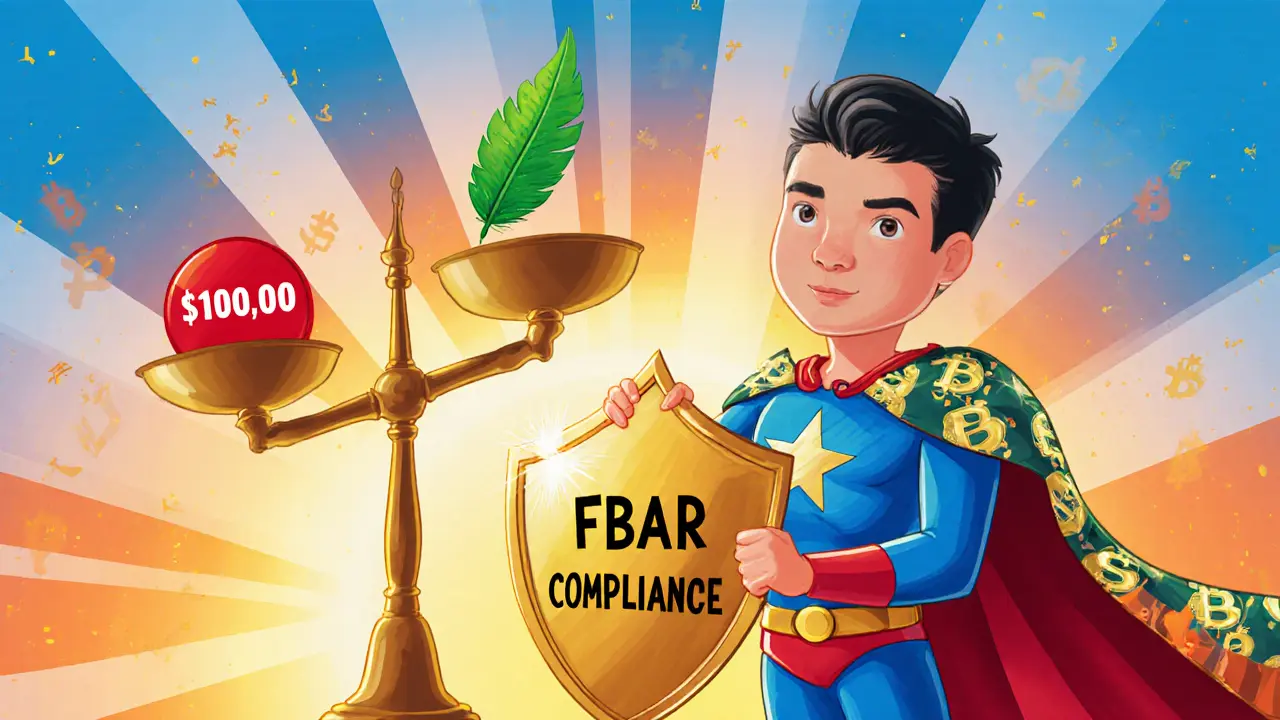Crypto FBAR Compliance Checker
Check if You Need to File an FBAR
Enter the number of foreign crypto accounts and their maximum values during the year to determine if you need to file a FBAR.
Result:
Key Takeaways
- U.S. persons must report any foreign crypto exchange account that hits $10,000 in aggregate value.
- Willful non‑filers can face up to FBAR penalties of $100,000 per violation or 50% of the highest account balance.
- Non‑willful failures are capped at $16,536 per report (2025 figures).
- Filing is done electronically via FinCEN’s BSA E‑Filing System - no paper option.
- A solid checklist and reliable valuation method can keep you from costly mistakes.
Imagine discovering that the $8,000 worth of Bitcoin you keep on a foreign exchange could land you a six‑figure fine. That’s the reality for many U.S. taxpayers who assumed crypto accounts were off‑limits for the Foreign Bank Account Report (FBAR). This guide walks you through why crypto now falls under FBAR, what the $100,000 penalty really means, and exactly how to file correctly.
When the IRS talks about FBAR (Foreign Bank Account Report), it’s referring to a mandatory annual filing that U.S. persons must submit if they hold foreign financial accounts exceeding $10,000 at any time during the year. The report, officially FinCEN Form114, is administered by the Financial Crimes Enforcement Network (FinCEN) under the Bank Secrecy Act (BSA). Failure to file can trigger steep penalties, especially now that virtual currency is being pulled into the regulatory net.
What the FBAR Covers - Including Crypto
The original FBAR rules focused on traditional bank, securities, and insurance accounts. However, a 2023 FinCEN notice signaled a shift: virtual currencies held in overseas exchanges will be treated the same as any other foreign financial account. The rulemaking aims to amend the BSA so that any foreign crypto account with a value over $10,000 must be disclosed.
Who must file? U.S. citizens, residents, green‑card holders, lawfully present aliens, U.S. corporations, partnerships, and certain trusts. If the combined maximum value of all foreign accounts-crypto or otherwise-exceeds $10,000 at any point in the calendar year, a FBAR is required.
Understanding the $100,000 Penalty
Penalties fall into two buckets:
- Non‑willful violation: The IRS assumes the taxpayer made an honest mistake. The cap is $16,536 per report for 2025 (adjusted for inflation from the 2023 $10,000 figure).
- Willful violation: The taxpayer knowingly ignored FBAR rules. The fine jumps to $100,000 per violation or 50% of the highest account balance, whichever is greater. Multiple years of non‑filing can multiply the exposure.
These amounts were clarified in a 2025 penalties guide from Taxes for Expats, which raised the non‑willful cap and kept the willful cap at $100,000. The Supreme Court’s pending Bittner decision may later adjust the per‑report versus per‑account assessment, but the $100,000 figure remains the headline risk for crypto holders.
When Does Your Crypto Trigger FBAR?
Two key tests decide if you need to file:
- Aggregate value test: Add up the highest USD value of each foreign crypto account at any point during the year. If the sum tops $10,000, you must file.
- Foreign jurisdiction test: The exchange must be incorporated, organized, or otherwise located outside the United States. U.S.-based exchanges (e.g., Coinbase US) do not count, but BinanceInternational, Kraken EU, or any exchange with a non‑U.S. legal entity does.
Even a short‑term spike-say, a $12,000 Bitcoin balance on a foreign exchange for one day-triggers the filing requirement.
Step‑by‑Step: Filing a Crypto FBAR
- Gather account info: Record the account holder’s name, account number (or a unique identifier), exchange name, and physical address of the exchange.
- Determine max value: Use a reputable source (CoinMarketCap, Bloomberg, or a major exchange’s historical rates) to capture the highest USD value for each account. The IRS’s Rev. Rul.2019‑24 requires a “reliable exchange rate.”
- Convert to USD: Apply the month‑end rate for each month, but flag any day where the balance exceeds the $10,000 threshold.
- Complete FinCEN Form114: Log in to the BSA E‑Filing System, select “Add New Report,” and fill out the required fields. The form asks for the maximum value, account type ("Virtual currency account"), and the exchange’s details.
- Attach supporting docs: Upload screenshots of account balances, transaction histories, and proof of the exchange’s foreign status. While not mandatory, documentation shields you if the IRS later audits.
- Submit before the deadline: April15 is the default deadline; an automatic extension to October15 is available if you file a Form4868 for your tax return.
Remember, the FBAR is filed separately from your federal tax return; you do not attach it to Form1040.
Common Crypto FBAR Mistakes & How to Dodge Them
- Assuming crypto is exempt: The new FinCEN rule removes the gray area. Treat every foreign exchange like a bank.
- Mixing up thresholds: The $10,000 limit is an aggregate across all foreign accounts, not per‑account.
- Using the wrong valuation date: The IRS wants the highest balance during the year, not just the year‑end figure.
- Skipping documentation: Without screenshots, the IRS may deem your explanation “unreasonable” and impose higher penalties.
- Relying on exchange‑provided reports alone: Some exchanges list balances in native crypto, not USD. Convert yourself using a reliable source.
One Reddit user, u/OverseasCrypto, learned the hard way-an unreported $12,000 Kraken EU balance resulted in a $100,000 willful penalty. In contrast, u/CompliantCryptoTrader filed amended FBARs with reasonable‑cause statements and escaped any fine.

Crypto FBAR Compliance Checklist
| Task | Details |
|---|---|
| Identify foreign exchanges | List every exchange with a non‑U.S. legal entity (e.g., Binance International, Kraken EU). |
| Gather account identifiers | Account number, username, or any unique ID the exchange provides. |
| Calculate max USD value | Use reputable month‑end rates; flag any day the balance > $10,000. |
| Document evidence | Screenshot balances, transaction history, exchange’s jurisdiction page. |
| File through BSA E‑Filing | Select “Virtual Currency Account” as account type; attach supporting docs. |
| Set reminder for next year | Mark April15 (or Oct15 if extended) on your calendar. |
Professional Help & Tools Worth Considering
Crypto tax compliance can eat up 8‑12 hours per client, according to the AICPA’s 2024 survey. If you’re not a tax pro, hiring a specialist can save you from a $100,000 hit.
- Specialized CPAs: Look for practitioners who list “crypto FBAR” as a service. Hourly rates range $350‑$600.
- Automated software: CoinLedger offers a crypto FBAR module for $99‑$299 per year. TurboTax 2024.2 and TaxAct’s CryptoPro FBAR add‑on also handle the Form114 upload.
- DIY resources: The IRS’s Publication5569 provides the official filing instructions; FinCEN’s BSA E‑Filing website has a sandbox for practice submissions.
Regardless of the route you take, keep a paper trail of every step. If the IRS ever challenges your filing, you’ll have the backup they demand.
Frequently Asked Questions
Do I need to file an FBAR if I only hold crypto on a U.S. exchange?
No. The FBAR applies only to accounts with a foreign legal entity. U.S.-based platforms like Coinbase US are exempt, but any exchange incorporated abroad-like Binance International-must be reported if the aggregate value exceeds $10,000.
What if I missed the filing deadline?
You can still file a late FBAR. The penalty for a non‑willful late filing is the same $16,536 cap, but the IRS may increase it if they deem the omission reckless. Filing as soon as possible reduces risk.
How is the $100,000 penalty calculated?
For a willful violation, the IRS assesses the greater of $100,000 or 50% of the highest balance in the foreign crypto account during the year. If you held $30,000 at peak, the penalty would be $100,000 (since it exceeds 50% of $30,000).
Can I amend a past FBAR instead of paying a penalty?
Yes. Submitting an amended FBAR with a reasonable‑cause statement can persuade the IRS to waive penalties, as demonstrated by several Reddit users who avoided fines after voluntary correction.
Do I need to report crypto held in a foreign wallet that I control?
If the wallet is hosted on a foreign exchange or custodial service, it counts as a foreign account. Self‑custodied wallets stored on hardware devices with no foreign entity involvement are not FBAR‑reportable.





angela sastre
October 10, 2025 AT 02:25Just filed my crypto FBAR last week-used CoinLedger and it was a breeze. Seriously, if you're holding any foreign exchange crypto, don't wait until the IRS knocks. I had $14k on Kraken EU and thought 'eh, it's just Bitcoin'... yeah, nope. Now I'm sleeping better.
Aniket Sable
October 10, 2025 AT 20:04bro i didnt even know this was a thing till last month. now i got 3 accounts on binance intl and i’m panicking. how do i even find the max value???
Mike Kimberly
October 10, 2025 AT 21:07Hey Aniket, I feel you. The hardest part is tracking the daily highs across multiple exchanges. I used CoinMarketCap’s historical API and pulled monthly snapshots. If you’re not tech-savvy, just screenshot your balance every time it hits above $10k-then pick the highest one. Don’t overthink it. The IRS doesn’t want perfection, they want evidence you tried. I’ve helped three friends file this year, all non-willful, all under $16k penalty. You’re fine.
Also, don’t use exchange-provided statements unless they show USD. Most just show BTC or ETH. Convert using the exchange’s own trade history or CoinGecko. I’ve seen too many people get tripped up by that.
And yes, it’s a pain. But imagine the alternative: a $100k bill because you thought ‘it’s just crypto’ and didn’t report. That’s not a mistake. That’s a lifestyle choice you’ll regret for a decade.
Pro tip: File the FBAR before April 15, even if you’re filing late. The system auto-accepts it. Then send a reasonable cause letter with your amended return. I’ve seen it work twice this year. You’re not alone.
Will Atkinson
October 11, 2025 AT 02:35Thank you, Mike! Seriously, this is the kind of calm, clear advice we need in this space. I’ve been helping my cousin who’s a crypto miner in Germany-he had $22k on Binance.US (wait, no, Binance International!) and panicked for weeks. We used your method: screenshots + CoinMarketCap + BSA E-Filing sandbox. He filed on April 10 and got an auto-confirmation email. No penalties. Just relief.
Also, shoutout to the IRS for finally making this clear. I used to think crypto was a loophole. Now I get it: it’s just another asset. Treat it like a Swiss bank account. If you wouldn’t hide a Swiss account, don’t hide a Binance one.
And to everyone still waiting: please, please, please don’t wait until October. The extension is for tax returns, not FBARs. File early, sleep well.
Claymore girl Claymoreanime
October 12, 2025 AT 01:41Wow. Just... wow. People are still acting like this is optional? You’re not ‘just holding Bitcoin’-you’re holding a financial instrument under U.S. jurisdiction, and the BSA has been clear since 2023. If you’re not filing, you’re not ‘being smart’-you’re gambling with your life savings. One audit, one willful designation, and poof: your house is gone. This isn’t tax avoidance. This is civil forfeiture waiting to happen.
And for those asking about ‘self-custody’? Don’t be naive. If you’re using a foreign custodial wallet-like a Ledger connected to a non-U.S. exchange-you’re still reporting. The IRS doesn’t care if you ‘own’ it. They care if a foreign entity has control. Period.
And yes, I’ve seen the $100k cases. They’re not myths. They’re real. One guy lost $140k because he thought ‘I didn’t sell, so it doesn’t count.’ He didn’t even know FBAR existed. Now he’s in a payment plan with the IRS. Don’t be him.
Edwin Davis
October 12, 2025 AT 23:29Why are we even talking about this? This is why America’s tax system is broken. We’re policing people for owning digital assets while billionaires use offshore trusts to pay 0%. This isn’t fairness-it’s harassment of the middle class. If you want to catch tax evaders, go after the hedge funds, not the guy who bought ETH on Binance International.
And don’t get me started on ‘reliable exchange rates.’ What’s reliable? CoinGecko? CoinMarketCap? Coinbase? Pick one and stick with it. The IRS doesn’t care, but they’ll still penalize you if you pick the wrong one.
Stop pretending this is about compliance. It’s about revenue. And it’s unfair.
Patrick Rocillo
October 13, 2025 AT 04:14Just filed my FBAR using TurboTax CryptoPro. 🎉 Took 20 mins. No tears. No panic. Just clicked ‘Virtual Currency Account’ and pasted my export. The system auto-calculated the max value from my Kraken EU history. I didn’t even know I had to do this until last week. Now I’m a convert. 🙌
Also, if you’re on Binance.US, you’re safe. But if you ever used Binance.com-even once-you’re in the net. I had a $1.2k balance from 2021 I forgot about. I reported it. No penalty. Just a sigh of relief.
Santosh harnaval
October 13, 2025 AT 22:48Reported my Binance account last year. No penalty. Just paperwork. Done.
monica thomas
October 14, 2025 AT 05:45Thank you for this comprehensive and meticulously detailed exposition. The clarity with which the regulatory framework has been articulated is both reassuring and academically rigorous. I would like to respectfully inquire whether the referenced FinCEN notice from 2023 has been codified into 31 CFR § 1010.380, and if so, whether the 2025 non-willful penalty adjustment was published in the Federal Register under Docket No. FINCEN-2024-0017. I am preparing a compliance memorandum for my firm’s international clients and would appreciate authoritative citation.